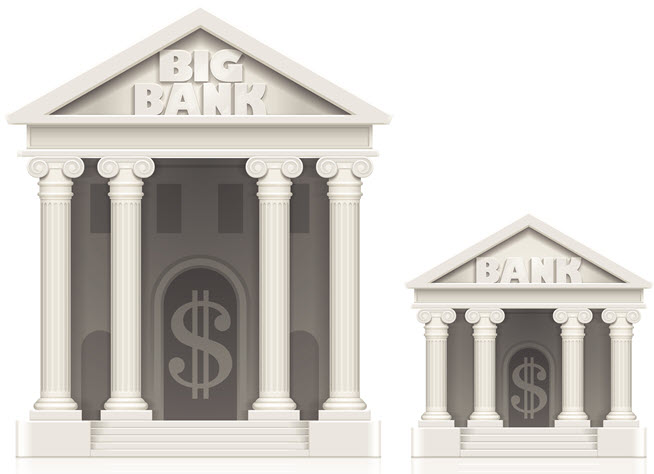
For many owners of growing companies, the choice of a bank is a crucial decision. A solid relationship with a bank can make or break a company. Banks provide relatively cheap capital to fund expansion as well as the everyday transactional and payment services that enable everyday operations.
A poor relationship with your bank can hinder growth plans and even put you out of business. Still, many business owners simply stumble into doing business with a bank because of convenience or with the mistaken assumption that all banks are all the same. A wise business owner puts effort into developing and maintaining a relationship with their bank, just like they do with key customers and suppliers, to ensure their long term success.
A Bank in Simple Terms
Let’s talk about what a bank is: At its core a bank is a business that collects money from customers who happen to have more funds than they need at the moment and loans it out to customers who don’t have enough. Banks mostly live on the difference between what they pay for deposits and what they receive in interest payments. Fees for services like handling customer accounts and originating loans make up most of the rest of their income stream.
Finding Another Bank
Like any business, banks try to expand their relationships with profitable customers and minimize relationships with unprofitable or risky ones. What makes for a good customer or a risky one varies between banks. Business owners need to find a bank that thinks THEY are a good customer. If a bank doesn’t like your type or size of company, you are probably best served to simply find another bank rather than to try to convince them to change their mind.
The Right Bank
For most growing companies, the first step in discerning the right bank for them is to simply make a list of which banks do a lot of business in their area. Banks are often reluctant to do business with companies outside their self-defined markets because they often have trouble knowing who’s who in a new market and which industries they want to support.
The pages of banking history are littered with stories of banks doing business outside their core markets and leaving most of their capital behind when they pull out. Even if your finances are solid if a bank decides to retreat from your area they are likely going to drop you as a customer, maybe at a very inconvenient time.
![]() Bank’s Knowledge of Your Industry?
Bank’s Knowledge of Your Industry?
Find out which banks understand your industry and are committed to it.
- Which banks have a presence at your industry’s trade shows?
- Which ones have longstanding relationships with your suppliers or competitors?
Those are the banks most likely to understand your business and be willing to support you in good times and bad.
![]() Bank’s Decision-Making Process
Bank’s Decision-Making Process
Try to find out how a bank makes decisions. For instance, are credit decisions made locally or at a far-off underwriting center? Both methods can be effective – but you should understand how the decisions are made before you apply.
If you are a small or mid-sized company, most large banks will actually process your credit application at a regional or national back office, and most will largely base their decision on your personal creditworthiness – much like they would underwrite a credit card. Their local bankers are mostly information-gatherers rather than decision-makers.
Small and mid-sized banks will usually have a more decentralized decision-making process but charge a higher price or might lack the latest technological innovations. If a bank doesn’t like your industry, there is very little you can do to convince them otherwise.
For example, some banks like doing business with restaurants and contractors while others take a dim view. Some banks court real estate developers while others do not. The same thing goes for the technology industry, importers/exporters, and professional service providers. If you are in one of those industries, you just need to find a bank that likes your industry. Swimming upstream to stay with a bank that doesn’t really get your industry or companies of your size isn’t likely to be a productive use of your time. How do you find out whether a bank likes your industry? Ask them. And ask them if your industry is a key focus for them or whether they are really looking for another customer type.
![]() Bank’s Criteria
Bank’s Criteria
Try to find out what criteria your bank uses to make decisions. There are a wide variety of approaches and focal points that are based on a bank’s overall business strategy as well its particular “credit culture.”
- Some banks will focus on internally defined borrower cash flow metrics while others will take more interest in the collateral or personal guarantees.
- Some will focus their analysis on your company’s performance versus your industry peers.
Every company’s credit profile is a mix of strong and weak factors. You are more likely to enjoy a solid banking relationship if your company’s strengths match what your bank is looking for.
When to Establish a Relationship?
Don’t wait until you need to borrow to establish a banking relationship. Getting to know a good banker and carefully nurturing the relationship over time will streamline the process when the time comes to apply for credit. Early in your relationship you should:
- Invite a potential banker to tour your operations. Bankers love to get out of the office and take the tour. Be candid in your assessment of what’s working well for our company and where your challenges lie. A good banker will be trying to ascertain your business acumen during the tour, so don’t be afraid to show them what you know. And listen carefully to what they have to say. Do they demonstrate knowledge about your industry or tell you anything you didn’t already know? A banker who is savvy about your industry can give you lots of great ideas and add a lot of value.
- Give them a copy of your annual financial statements even if you don’t need to borrow money right now. When the time comes, a thick file always speaks louder to a credit underwriter than a thin one.
- Ask your banker for an introduction to people you want to do business with. Bankers usually know a lot of people in the local business community and are usually happy to make introductions. The right banker should know several people you will want to meet.
CFOs and Banks
Your CFO should also be a great resource in helping you discern the best bank for your company. CFOs have often built personal relationships with bankers at several banks and should be able to give you some real insight into where you should invest your relationship-building time.
Most companies employ controllers and other accountants, but most accountants don’t have the skillset to help you with a strategic project like finding a new banking relationship. After all, accounting is about the past: what happened, how should it be properly characterized, and have we recognized all of our liabilities. They are invaluable in making sure you are following the rules and keeping you out of trouble. CFOs are other financial professionals think more about the future: forecasts, budgets, strategies, business models, etc.
Both disciplines are necessary but recognize they are different and practitioners of one are less well suited to help you with the other.
Another Option
If you don’t have a CFO on your team, you might consider bringing on a fractional CFO to help you find the right bank. A good CFO can take the lead on putting together your banking package and can take the lead in negotiations. They can even play “bad cop” to your “good cop,” nurturing your personal connection to your banker.
Do you have questions or need help? Please contact us here!
About the Author
 Bill Palmer has experience with the finances of businesses and nonprofits from multiple perspectives. He was a senior commercial banker in the Seattle market for over 20 years. For the past 13 years he has been a consulting CFO for over a dozen companies and organizations in the Pacific Northwest. For more than seven years, he has acted as the Director of Finance & Operations at a private school where he has a broad range of responsibilities.
Bill Palmer has experience with the finances of businesses and nonprofits from multiple perspectives. He was a senior commercial banker in the Seattle market for over 20 years. For the past 13 years he has been a consulting CFO for over a dozen companies and organizations in the Pacific Northwest. For more than seven years, he has acted as the Director of Finance & Operations at a private school where he has a broad range of responsibilities.
Bill also serves as Board Treasurer for a local charity focused on children’s health issues. Previously, he helped found and served ten years on the governing board of a private school, where he built the business model, led the initial capital campaign which enabled the commencement of the school’s operations, negotiated long term loans, and set pricing policies.





